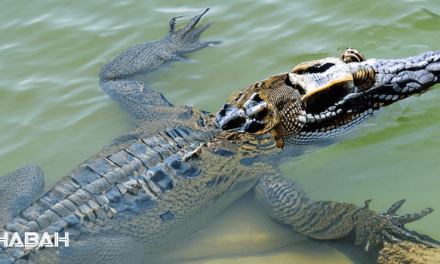Eating alligator meat is a controversial topic among Muslims. There is debate over whether consuming alligator is permissible (halal) or prohibited (haram) in Islam. This article will examine the evidence and opinions surrounding the permissibility of eating alligator to determine if it is halal or haram for observant Muslims.
Eating alligator meat is something not commonly found in Islamic culture or cuisine. Alligators are not native to the Middle East, so Muslims have not traditionally consumed this meat. Additionally, there is ambiguity surrounding the halal status of alligator because it is an amphibious animal that spends time both on land and in water. This brings up questions about whether general rulings related to land animals or sea creatures should apply to alligators.
Let’s look at the key considerations in determining if alligator meat is halal or haram for Muslims.
Is Alligator Meat Considered Halal or Haram According to the Quran and Hadith?
The Quran and hadith do not directly mention or prohibit the consumption of alligator meat. However, there are verses about foods that are haram, or forbidden:
“He has only forbidden to you dead animals, blood, the flesh of swine, and that which has been dedicated to other than Allah (swt).” (Quran, 2:173)
“That which is lawful is plain and that which is unlawful is plain and between the two of them are doubtful matters about which not many people know.” (Bukhari)
Based on these verses, scholars conclude that any meat not specifically prohibited is halal. Alligator is not one of the prohibited meats like pork, so some argue this indicates its permissibility. However, the verse referring to doubtful matters leaves room for debate.
How Do Scholars Classify Alligators – As Land Animals or Sea Creatures?
The halal status of alligator depends on whether it is classed as a land animal or sea creature. Seafood is universally considered halal in Islam. But there are differing opinions on how to categorize alligators because they divide their time between water and land.
Some scholars argue that since alligators spend most of their time in the water hunting for food, they should fall under the same rulings as fish and other sea creatures, meaning their meat is halal.
However, others point out that alligators do come up on land, so they have traits of a land animal as well. Land animals like cows and sheep are only halal if slaughtered properly according to Islamic guidelines. So some scholars believe alligators should be viewed cautiously like other game meat.
What Are the Opinions of Islamic Scholars on Alligator Meat?
Contemporary Islamic scholars have researched this issue and come to differing conclusions about the halal status of alligators.
Some prominent scholars like Yusuf al-Qaradawi argue that alligator meat is halal based on it being classified as a sea creature. He points out that other aquatic animals without scales like frogs are permitted, so alligator should be as well.
However, others like the Assembly of Muslim Jurists of America (AMJA) are more skeptical. They advise avoiding alligator since it cannot be definitively classified as a land animal or sea creature. They argue that in cases of doubt, it is best to avoid consuming a food item until its halal status is clear.
The Permanent Committee for Scholarly Research and Ifta in Saudi Arabia prohibited eating alligator meat, comparing it to eating predatory animals which is not permitted in Islam.
So opinions are mixed, with reputable scholars on both sides of the debate. This shows the complexity of the issue.
What Are Some Hadiths Relevant to the Alligator Meat Discussion?
There are some hadiths that provide wisdom related to this issue, even if they do not directly mention alligator meat:
“That which is lawful is clear, and that which is unlawful is clear, and between them are certain doubtful things which many people do not know. So he who guards against the doubtful things keeps his religion and his honor blameless.” (Bukhari and Muslim)
This demonstrates that it is pious to avoid doubtful matters when it comes to halal and haram.
A hadith from Tirmidhi states: “The halal is clear and the haram is clear and between them are matters unclear that are unknown to most people. Whoever is wary of these unclear matters has absolved his religion and honor. And whoever indulges in them has indulged in the haram.”
These hadiths support those scholars advising avoidance of alligator consumption due to its doubtful status.
What Are the Main Arguments That Alligator is Halal?
– Alligators spend most of their lives hunting in water, so they resemble fish and should fall under same halal rulings as seafood.
– Other aquatic creatures without scales like sharks, frogs, and turtles are considered halal, so alligators should be as well.
– General principle is that all meat is halal except what is specifically prohibited in Quran. Since alligator is not mentioned, it is permissible.
– Alligator leather and bones are used, indicating some implicit permissibility of consuming alligators.
– Alligator is seen as halal among some indigenous Muslim minority groups in places like China and the United States.
What Are the Main Arguments That Alligator is Haram?
– Alligators come up on land, so they share some traits with land animals whose meat must be slaughtered properly.
– Alligators are predatory animals, and there are hadiths that prohibit consumption of all land predators.
– Principle to avoid doubtful matters would suggest not eating alligator until its status is definitively settled.
– Scholars see wisdom in avoiding consumption of exotic meats not known to Islamic culture.
– General prohibition on eating reptiles, amphibians, and other exotic species.
Frequently Asked Questions – Is Alligator Halal?
Is alligator meat considered halal in Islam?
Alligator meat is a controversial topic among Muslim scholars. Some scholars consider it halal, while others believe it is prohibited in Islam.
What do the Quran and Hadith say about eating alligator meat?
The Quran and Hadith do not specifically mention alligator meat. Therefore, there is no direct ruling on whether it is halal or haram.
Are alligators and crocodiles treated the same way in terms of halal?
Alligators and crocodiles are similar in many ways, but the permissibility of consuming their meat may vary among scholars. It is best to consult with an Islamic scholar for a definitive answer.
Is it true that alligator meat is halal for Muslims?
Whether alligator meat is halal for Muslims depends on the interpretation of Islamic scholars. Opinions may differ, so it is advisable to seek guidance from knowledgeable scholars.
What is the general consensus on the consumption of alligator meat?
Alligator meat is not explicitly mentioned in Islamic texts, but some scholars consider it permissible to consume. However, others may believe it is best to avoid due to its nature as an amphibious animal.
Is alligator meat similar to fish when it comes to halal guidelines?
No, alligator meat is not similar to fish in terms of halal guidelines. While fish is universally accepted as halal, the permissibility of alligator meat is a subject of debate among scholars.
What do Muslim scholars generally say about alligator meat?
Opinions among Muslim scholars regarding alligator meat vary. Some consider it halal, while others prohibit its consumption. It is advisable to consult with a reliable Islamic scholar for a personalized answer.
Why is alligator meat considered controversial in Islam?
Alligator meat is considered controversial in Islam due to the absence of clear guidance in religious texts. Different scholars interpret the permissibility differently, leading to diverse opinions on its halal status.
Is the permissibility of eating alligator meat a strong or weak opinion?
The permissibility of eating alligator meat is a matter of differing opinions among scholars. While some consider it a strong opinion, others may view it as a weak one. It again depends on individual interpretations.
Conclusion
There are good faith arguments on both sides of this issue made by knowledgeable Muslim scholars and jurists. This shows that determining the halal status of alligator meat is not completely clear cut.
However, the weight of evidence seems to lean towards considering consumption of alligator meat as permissible but disliked or at minimum avoiding it for precautionary reasons. Given the general Islamic principles of avoiding doubtful matters when it comes to halal and haram, the wisest course of action may be for Muslims to avoid eating alligator meat until there is consensus among scholars permitting its consumption.
The takeaway is that while reasonable cases can be made both for and against alligator being halal, there is enough reason for caution and concern to warrant avoiding it. Muslims should focus on eating meats that are known to be permissible, and consult reliable scholars if considering eating alligator meat.
Key Points on the Halal Status of Eating Alligator:
– Alligator’s amphibious nature raises questions on whether rulings for land animals or sea creatures apply.
– There are differing scholarly opinions, with reasonable cases made on both sides.
– General Islamic principles advocate avoidance of doubtful matters when it comes to halal and haram.
– Strongest position seems to be that eating alligator meat is best avoided out of precaution.
– Muslims should focus on meats known to be definitively halal.
The evidence shows this is an ambiguous issue deserving careful consideration. While alligator meat may technically be halal, abstaining from consumption until there is consensus seems the wisest path for devout Muslims wishing to avoid anything potentially unlawful. This article aimed to outline the key perspectives to understand the nuances around the permissibility of eating alligator according to Islamic law and practice.





